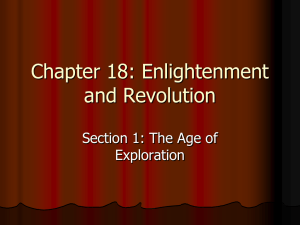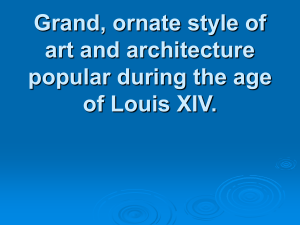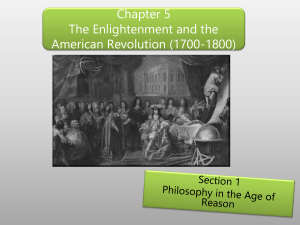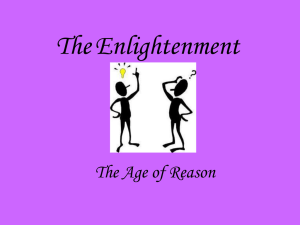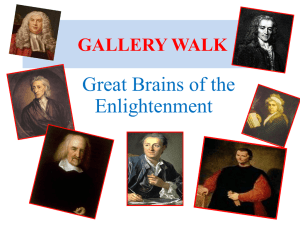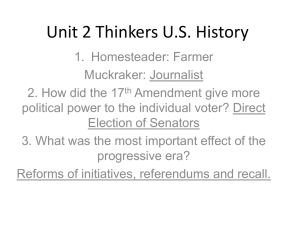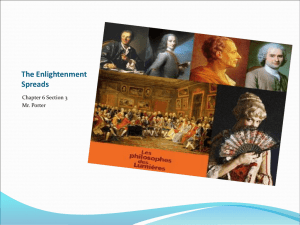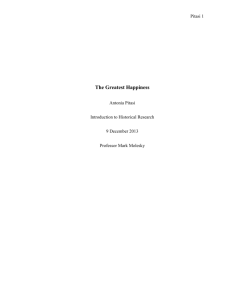Enlightenment Thinkers Salon
advertisement
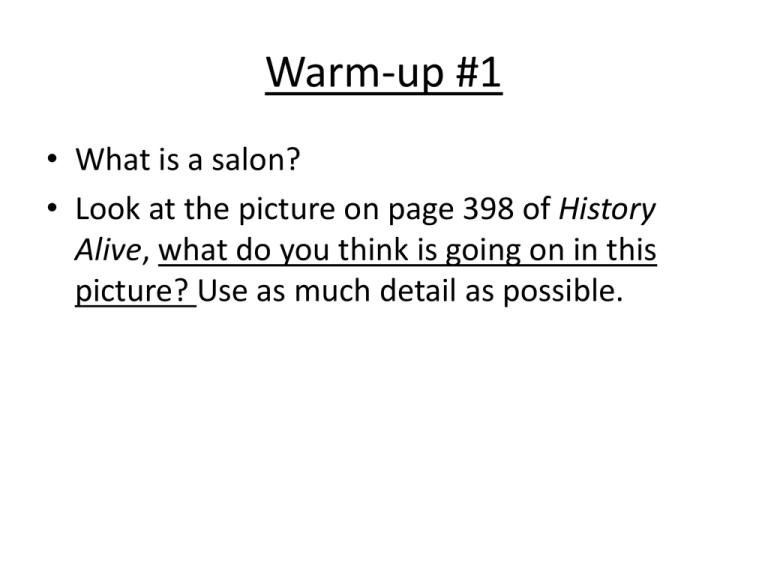
Warm-up #1 • What is a salon? • Look at the picture on page 398 of History Alive, what do you think is going on in this picture? Use as much detail as possible. Great Enlightenment Thinkers: Partner read sections 35.3 -35.7 Use the information to fill in this chart. Thinker Hobbes Locke Montesquieu Voltaire Beccaria Famous for… Other Key Concepts Famous works No Homework • Yay!!! Do Now • Continue to work on your Enlightenment Thinkers Chart… Great Enlightenment Thinkers: Partner read sections 35.3 -35.7 Use the information to fill in this chart. Thinker Famous for… Hobbes Absolute rule by Kings – human nature is bad so kings with lots of power are needed to control them. Other Key Concepts Famous works Humans are selfish. Gov’t must control the ppl W/o gov’t life would be “nasty, brutish, and short.” Leviathan Great Enlightenment Thinkers: Partner read sections 35.3 -35.7 Use the information to fill in this chart. Thinker Famous for… Other Key Concepts Locke Natural rights – all people are born with rights that cannot be denied: life, liberty, and property. • Constitutional Monarchy – king has to follow the Constitution. • Social Contract – ppl give govt power with understanding that it will protect their rights. • Supported Bills of Rights Famous works Two Treatises of Government Great Enlightenment Thinkers: Partner read sections 35.3 -35.7 Use the information to fill in this chart. Thinker Famous for… Other Key Concepts Famous works Montesquieu Separation of Powers – divide government’s power equally among three separate branches of government (executive, judicial, legislative) Each branch of government has limited power that is limited by the other two branches. Persian Letters, The Spirit of Laws Great Enlightenment Thinkers: Thinker Famous for… Voltaire • Religious Natural religion – all tolerance (allow religions have some people to practice truth religious in their own ways) • free speech Beccaria Rights of the Accused – ppl accused of crimes should have rights too (fair trail, no cruel and unusual punishment…) Other Key Concepts Famous works Candide • Fair speedy trial On Crimes • No torture and • Equal punishments Punishments that fit the crime. • No capital punishment (death penalty) Enlightenment Salon Activity • “Visit” each of the five Enlightenment thinkers. • Use your knowledge and your Enlightenment Thinkers Chart to help you answer the questions they “ask” you. • Record your answers in detailed, specific, and complete sentences on your Enlightenment Thinkers Reading Notes 35 worksheet. Salon Questions: • Cesare Beccaria • “As a lawyer, I observe many practices in the justice system that seem terribly harsh and unfair. What are some of those practices? • In my book On Crimes and Punishments, I share my ideas on how criminals should be treated. What are some of the main ideas in that book?” Salon Questions: • Voltaire • “There is a right I believe in so strongly that I will defend it to the death. What is that right? • I am well know for criticizing intolerance wherever I see. What happened to me because of my outspoken criticism of authorities?” Salon Questions: • Montesquieu • “In my book The Spirit of Laws, I describe how I think governments should be organized. What do I call my idea, and how does it work? • What am I afraid might happen if a government doesn’t use this idea? Salon Questions: • Locke – • “What do I think government the purpose of government is? What rights do I think government should respect? • In my famous book, Two Treatises of Government, I argue that government should exist only with the consent or approval of whom? What did I say should happen if the government does not do its job?” Salon Questions: • Hobbes – • “I am sure you are familiar with my famous book Leviathan. In my book, I describe my beliefs about what human beings are really like. What are some of the words I would use to describe what people are really like? • Because of my view of what people are really like, I have strong opinions about government. Why do I think governments were created? What kind of government would be best, and why? Homework • Chapter 17.2 Assessment (Holt Blue Book) • #s 1a, 2a, 2b, 2c, and 3b.
